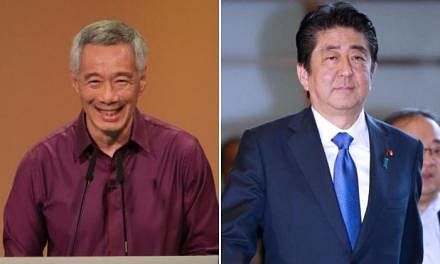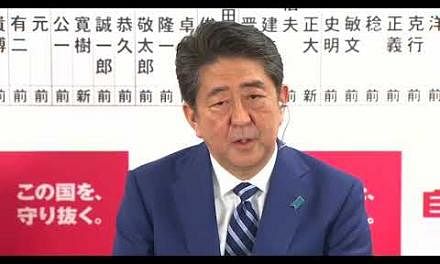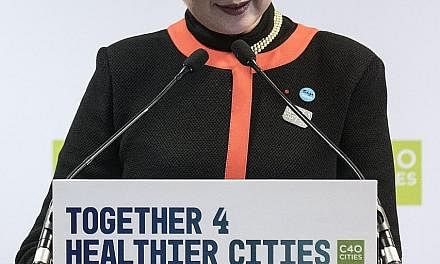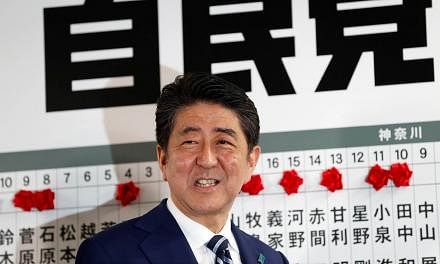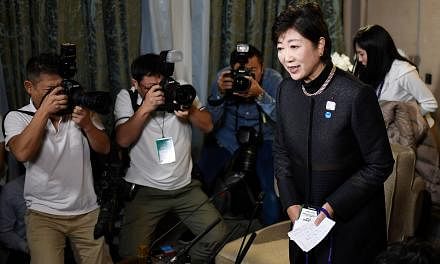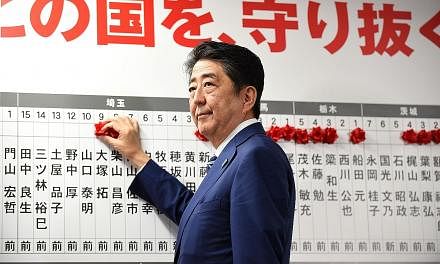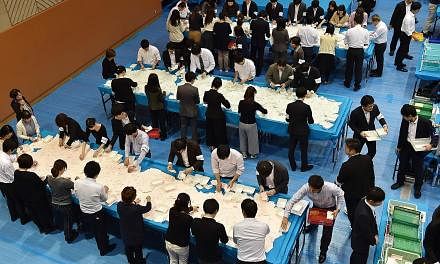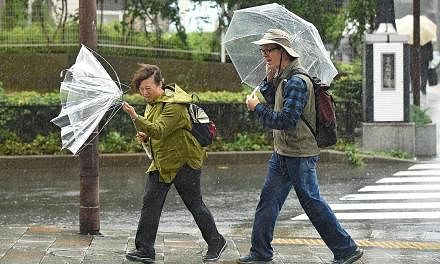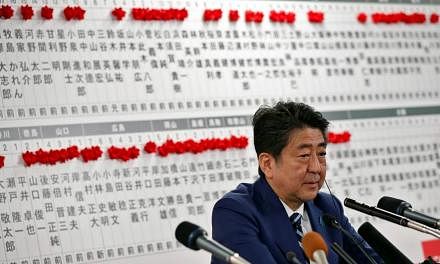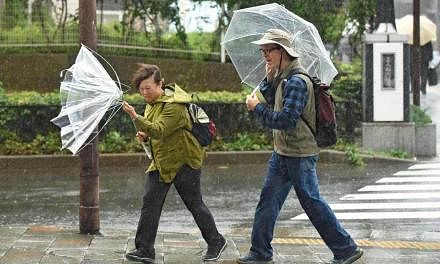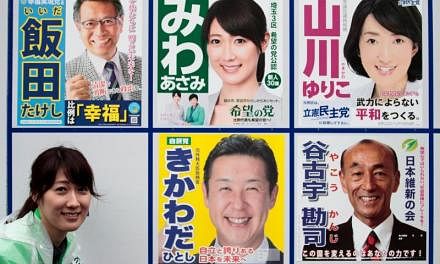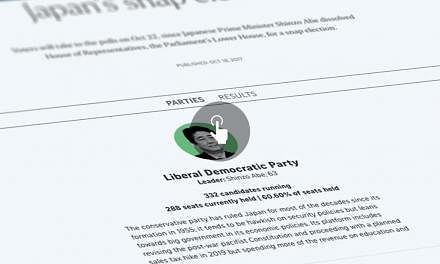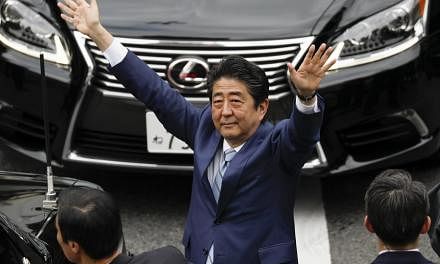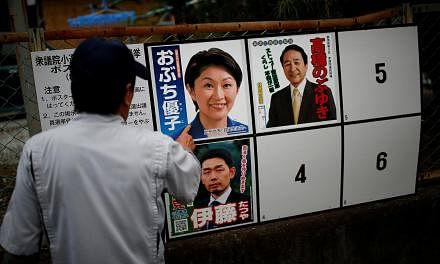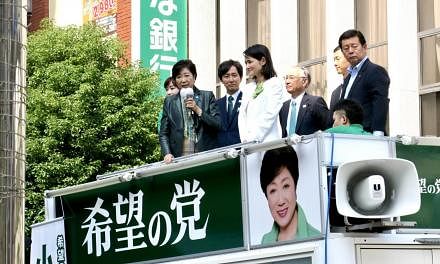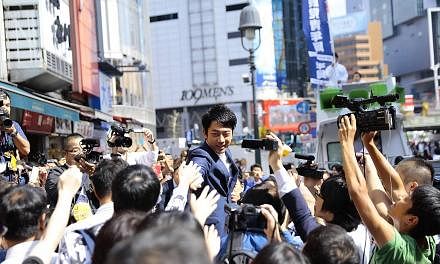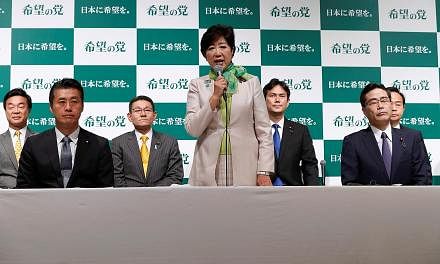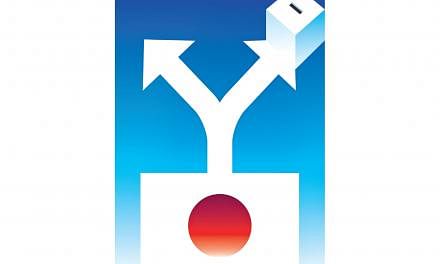TOKYO - If media surveys are to be believed, Japan's ruling Liberal Democratic Party (LDP) is on course for a huge victory in Sunday's (Oct 22) general election despite Prime Minister Shinzo Abe's tumble in approval ratings earlier this year.
This is the result of an opposition that, caught offguard by Mr Abe's snap election call, has not captured voters who are beginning to feel an improvement in the economy. The North Korean threat has also created a flight to safety instinct that favours the ruling LDP.
The question, however, is whether Mr Abe's LDP-Komeito coalition will keep its two-third "supermajority" in Parliament by winning 310 out of the 465 seats in the lower chamber of Parliament.
Support from two-thirds of the Lower House will help pave the way for Mr Abe to realise his grandiose ambition of becoming the first to amend Japan's 70-year-old Pacifist Constitution, to specify the role of the military. But this is controversial as critics worry this could be start of a slippery slope which eventually leads to a remilitarised Japan.
Japanese voters will cast their votes from 7am to 8pm on Sunday (Oct 22).
But voter turnout, which hit an all- time low of 52.7 per cent in the 2014 election, could again be affected by heavy rains nationwide as Typhoon Lan makes landfall.
On Saturday (Oct21) night, Mr Abe battled the rain at his final rally at the Akihabara electronics district in Tokyo, addressing a packed crowd fervently waving the national flag. He said Japan has grown economically since LDP took power in 2012, and that the party provides stability in the face of the North Korean threat.
In a speech on Saturday night at Tokyo's Akihabara shopping district, Mr Abe pledged to apply so much pressure on North Korea that the regime would change its ways and ask for negotiations.
"What is needed is strong diplomacy," said Mr Abe, vowing to work with US and Russian leaders to achieve his goal.
"We must not yield to the threat of North Korea," he said to cheers from the crowd.
Media surveys have shown that the LDP-Komeito coalition will win between 290 and 320 seats. Even if it does not win two-thirds of the seats, the good news for Mr Abe is that rivals Kibo no To (Party of Hope), run by Tokyo Governor Yuriko Koike, as well as the Osaka- based Nippon Ishin no Kai (Japan Innovation Party) are both in favour of revising the Constitution.
But the challenge for Mr Abe is that he will have to strike concessions with these other pro-revision groups over the clauses to change.
Besides amending the war-renouncing Article 9, Mr Abe also wants to change the law of the land to mandate free education, and to give the prime minister emergency powers during crises.
Though the LDP and Komeito appear on course for a comfortable majority, Mr Abe has set a modest goal of 233 seats, or a simple majority, for the ruling bloc. Failing which, he said, he would resign.
The LDP had 290 seats, and with the Komeito's 34, controlled 68.2 per cent of the 475-seat Lower House. There are 10 fewer seats this time, after electoral boundaries in rural areas were redrawn to ensure voting parity.
Even though surveys showed that the opposition challenge is fizzling out, analysts said Mr Abe's position as LDP leader may still be in jeopardy in the event of a poor showing, with an internal party leadership election due next year.
University of Tokyo political observer Yu Uchiyama said: "If the LDP alone is unable to win a simple majority, or if the ruling coalition loses more than 50 seats, Mr Abe will lose influence and there may be voices - within the LDP - asking him to take responsibility."
Rules were revised this year to allow Mr Abe a third consecutive term as LDP chief, and hence, prime minister. But former foreign minister Fumio Kishida, former defence minister Shigeru Ishiba, and current internal affairs and communications minister Seiko Noda are all eyeing the role.
The snap election was called after a bruising year for Mr Abe, whose approval fell to below 30 per cent at one point in the wake of two cronyism scandals.


